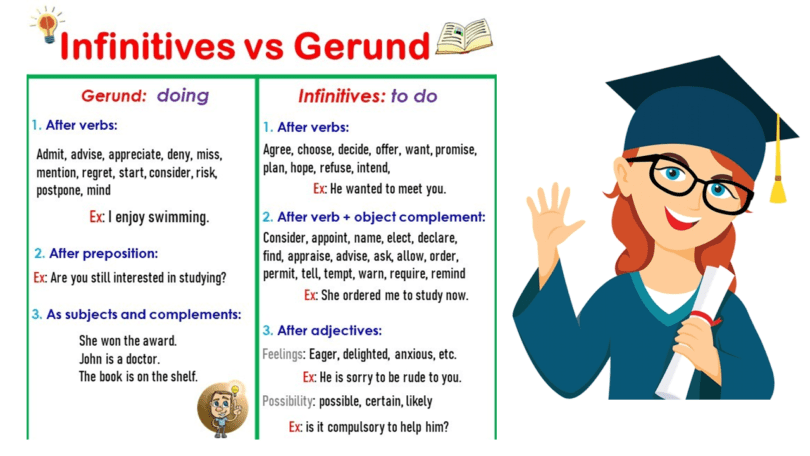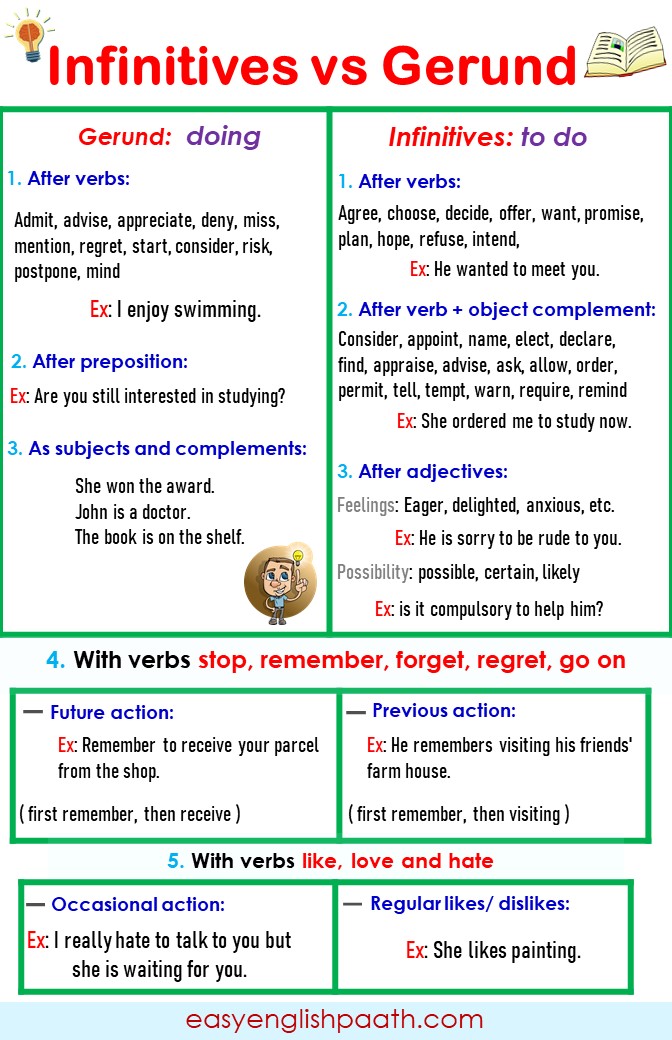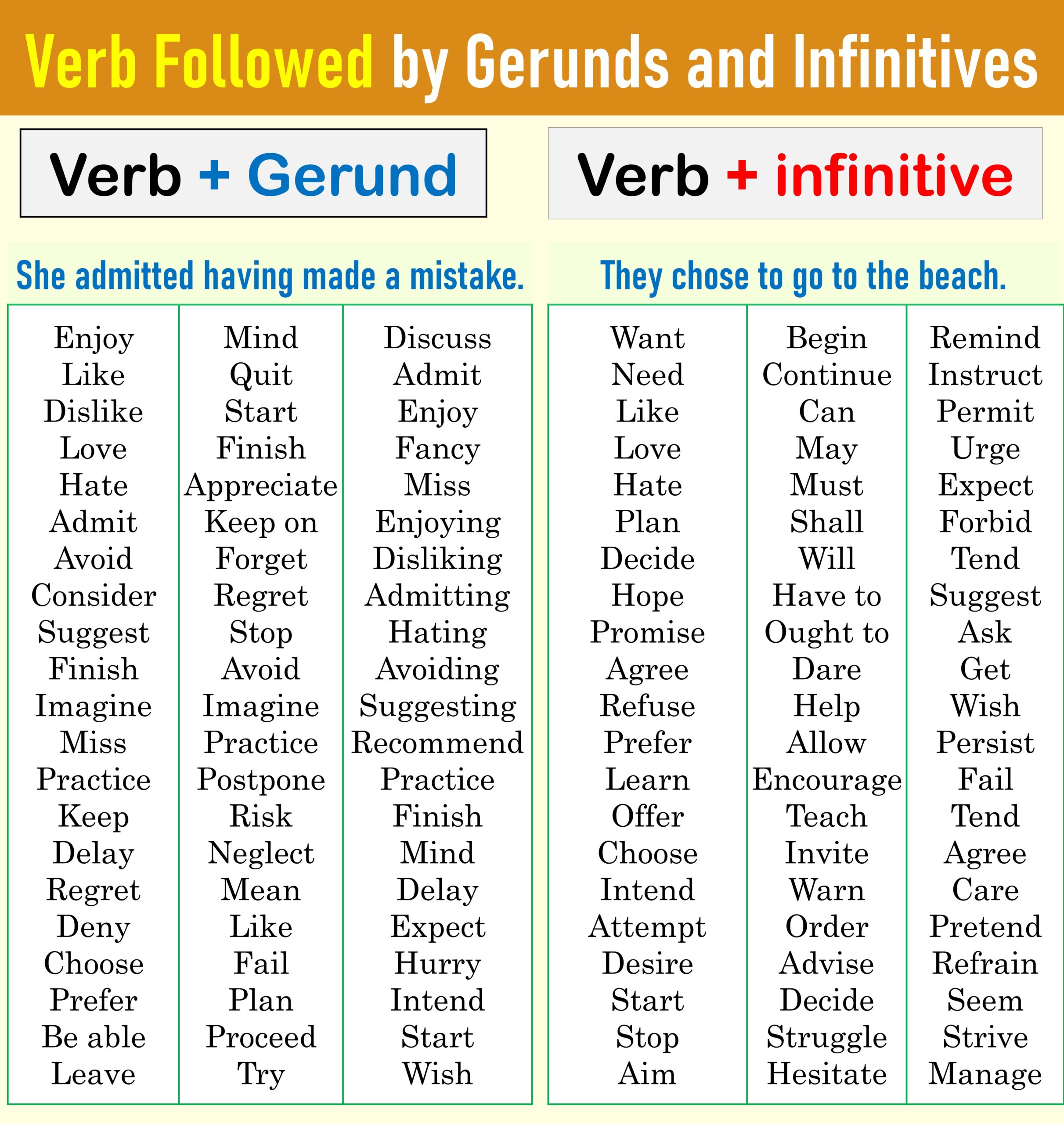Gerunds are verbs that act like nouns, and end in ‘ing’ like swimming or reading They are used to express actions as things. While infinitives, on the other hand, are the base form of a verb, they often go before ‘to’ like to swim or to read. They can act as nouns, adjectives, or adverbs in Sentences. Learning how to use gerunds and infinitives correctly can notably improve your English skills.
What Are Gerunds and Infinitives?
First of all, we need to learn that what are gerunds and infinitives? These are verb forms that don’t act like regular verbs in sentences. They often take on roles as nouns, adjectives, or adverbs.
Gerunds:
These are verbs that end in -ing (e.g., running, swimming). They function as nouns and are used to indicate an action or an activity.
Example Sentences:
- I love swimming in the ocean.
This sentence expresses enjoyment of an activity using the gerund swimming as the object of love.
- I enjoy reading at night.
This sentence shows a preference for an activity using the gerund reading as the object of enjoy.
Infinitives:
These are the base form of a verb (e.g., to run, to swim). Infinitives can also act as nouns, but they can be used in various ways.
Example Sentences:
- I want to climb a mountain.
This sentence expresses a desire using the verb want followed by the base form climb.
- I want to learn a new language.
This sentence expresses a desire using want followed by the base verb learn
When to use Gerunds vs. Infinitives:
Gerunds are like the action words in English grammar. They are used only when you want to talk about an action as a thing. Gerunds can be used in the following situations:
| Usage | Gerunds (-ing form) | Infinitives (To + base verb) |
|---|---|---|
| As the subject of a sentence | Swimming is fun. | To swim is fun. (Less common) |
| After certain verbs | I enjoy reading books. | I want to read a book. |
| After prepositions | He is good at painting. | (Infinitives do not follow prepositions) |
| In compound nouns | Running shoes are expensive. | (Not used in compound nouns) |
| To express purpose | (Gerunds do not express purpose) | She studies to pass the test. |
Differences Between Gerunds and Infinitives
| Aspect | Gerunds (Base verb + -ing) | Infinitives (To + base verb) |
|---|---|---|
| Form | Running, Swimming, Reading | To run, To swim, To read |
| Function | Act as nouns (subject, object, or complement). | Act as nouns, adjectives, or adverbs. |
| Usage with Verbs | Follow some verbs (enjoy, avoid, suggest). | Follow some verbs (decide, want, promise). |
| Preposition Use | Always follow prepositions (good at painting). | Do not follow prepositions (Incorrect: good at to paint). |
| Purpose Expression | Cannot express purpose (Incorrect: She studies passing the exam). | Used to express purpose (She studies to pass the exam). |
Verbs with Both Gerunds and Infinitives
Sometimes, the same verb is also be followed by both a gerund and an infinitive in a sentences, and that changes the meaning. Common examples include like, love, hate, and, start. For instance:
| Sentence with Infinitive | Meaning | Sentence with Gerund | Meaning |
|---|---|---|---|
| I love to travel. | I love the idea or possibility of traveling. | I love traveling. | I enjoy the experience of traveling. |
| He began to work on the project | He started, but may not have continued. | He began working on the project. | He started and continued working. |
| She forgot to call her friend. | She didn’t remember to make the call. | She forgot calling her friend. | She doesn’t remember making the call. |
Common Verbs Following Gerund
| Verb | Example |
|---|---|
| Admit | She admitted having made a mistake. |
| Advise | He advised avoiding traffic during rush hour. |
| Appreciate | They appreciate helping us in our time of need. |
| Consider | I’m considering going on a vacation this summer. |
| Delay | The delay resulted in us missing the train. |
| Deny | He denied breaking the window. |
| Enjoy | They enjoy spending time together. |
| Finish | She finished reading the book last night. |
| Imagine | He imagined winning the lottery. |
| Mention | She mentioned attending a great concert. |
| Miss | I’ll miss seeing you when you move. |
| Postpone | They postponed having the meeting. |
| Recommend | I recommend trying the new restaurant. |
| Regret | She regretted not going to the party. |
| Resist | He couldn’t resist eating the delicious cake. |
| Start | They started working on the project. |
| Suggest | She suggested taking a break. |
| Involve | The project involves working with a team. |
| Keep | He keeps talking during movies. |
| Avoid | He avoids eating junk food. |
Common Verbs Follows by Infinitives
| Verb | Example |
|---|---|
| Agree | She agreed to help with the project. |
| Choose | They chose to go to the beach. |
| Decide | He decided to take a vacation. |
| Offer | She offered to buy lunch for everyone. |
| Want | I want to learn a new language. |
| Promise | He promised to be on time. |
| Plan | They plan to visit Paris next summer. |
| Hope | She hopes to travel the world someday. |
| Refuse | He refused to eat the vegetables. |
| Seem | It seems to be a beautiful day. |
| Desire | They desire to succeed in their careers. |
| Intend | I intend to finish my work early. |
| Attempt | She attempted to break the record. |
| Need | We need to buy some groceries. |
| Prefer | He prefers to drink tea instead of coffee. |
| Forget | Don’t forget to lock the door. |
| Hesitate | She hesitated to answer the question. |
| Expect | They expect to win the game. |
| Manage | He managed to solve the puzzle. |
| Learn | She wants to learn how to dance. |
Common Verbs Followed by an Indirect Plus an Infinitive
| Verb | Example Sentence |
|---|---|
| Advise | She advised me to take the test early. |
| Allow | They allowed the students to leave early. |
| Ask | He asked her to help with the project. |
| Beg | She begged him to stay for dinner. |
| Cause | His words caused her to cry. |
| Challenge | The coach challenged the team to do their best. |
| Convince | He convinced his parents to let him go out. |
| Dare | She dared him to jump into the lake. |
| Encourage | They encouraged us to participate in the contest. |
| Expect | The teacher expected her students to study harder. |
| Forbid | The rules forbid us to park here. |
| Force | The situation forced them to make a decision. |
| Hire | The company hired him to manage the project. |
| Instruct | She instructed her assistant to file the papers. |
| Invite | They invited us to attend the wedding. |
| Order | The officer ordered the soldiers to move forward. |
| Permit | The school permitted students to use calculators. |
| Persuade | He persuaded his friend to join the club. |
| Remind | She reminded me to call my mother. |
| Tell | He told them to wait outside. |
Common Mistakes with gerunds and infinitives:
- Using an infinitive after a preposition
❌ I’m interested to learn English.
✅ I’m interested in learning English.
2. Using a gerund instead of an infinitive after certain verbs
❌ She decided going home early.
✅ She decided to go home early.
3. Using an infinitive after a verb that requires a gerund
❌ He enjoys to swim.
✅ He enjoys swimming.
4. Using a gerund in place of an infinitive to express purpose
❌ I exercise for keeping fit.
✅ I exercise to keep fit.
5. Confusing meaning changes
❌ She stopped to smoke.
✅ She stopped smoking.
FAQs
Q1: What is the difference between a gerund and an infinitive?
A gerund is a verb ending in -ing that acts as a noun (Swimming is fun), while an infinitive is the base form of a verb with to (She likes to swim).
Q2: Can all verbs be followed by both gerunds and infinitives?
No, some verbs take only gerunds (enjoy, avoid, suggest), some take only infinitives (decide, promise, refuse), and some can take both with a change in meaning (stop, remember, forget).
Q3: Do gerunds and infinitives function the same in a sentence?
Both can act as subjects, objects, or complements, but their usage depends on the verb and context.
Q4: What are common mistakes with gerunds and infinitives?
Using the wrong form, like She suggested to go (incorrect) instead of She suggested going (correct).
Q5: Are there fixed expressions with gerunds and infinitives?
Yes, phrases like “can’t help + gerund” (I can’t help laughing) and “be about + infinitive” (She is about to leave).
You May Also Like







